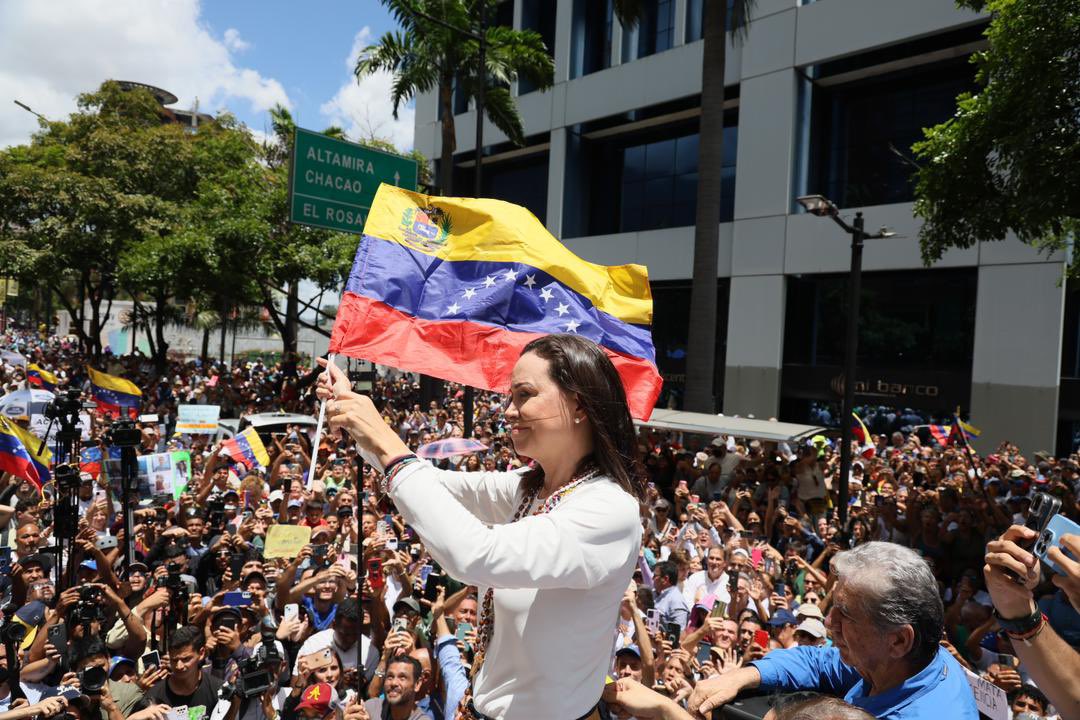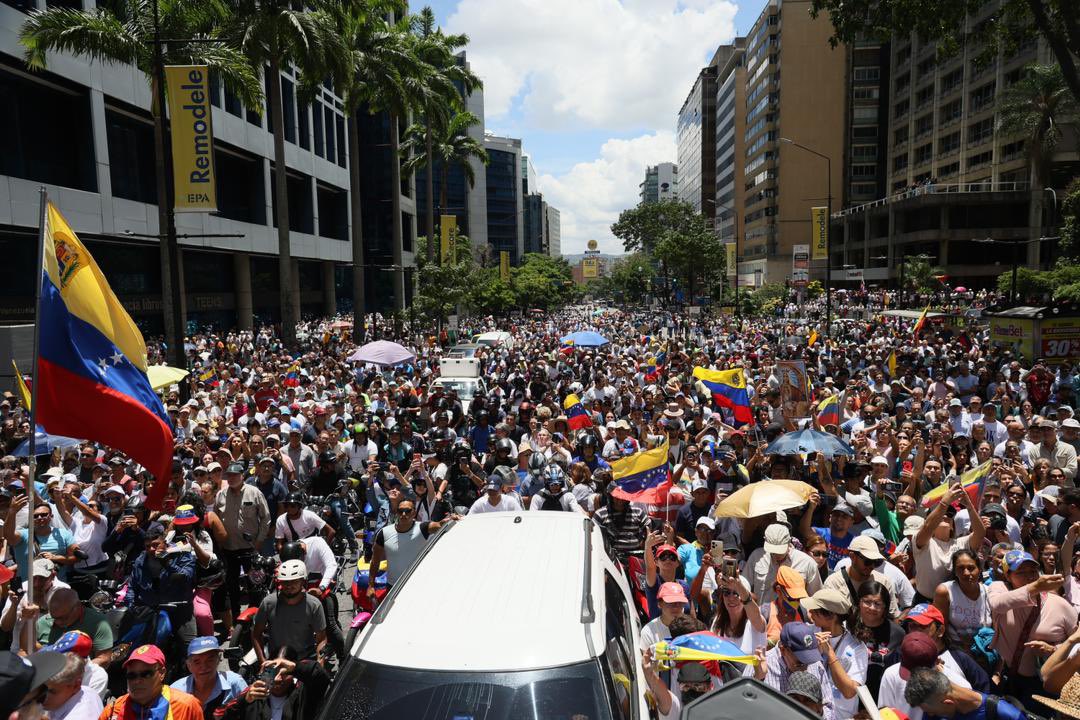President Nicolás Maduro’s contested victory on July 28 is more evidence of the dwindling power of the opposition inside the country over the past few years, making it easier for the autocratic leader to maintain his grip. Yet, the fight is far from over with opposition leader María Corina Machado adamant exiled candidate Edmundo González will be sworn in January.
Millions of Venezuelans around the world were tuned in to livestreams on a late July Sunday night. Hours after polling ended for the presidential election and hours after the government said the results would be released, the head of the National Electoral Council took the microphone to read out the future of Venezuela. As the man read the numbers, any hopes that the results would mirror polling numbers that showed a landslide oppositions victory were quickly dashed.
Protests erupted shortly after, and a crushing crackdown followed as President Nicolás Maduro took steps to shore up his autocracy and escalated pre-election repression. At least two dozen people were killed and scores more in the aftermath of the election, An estimated 2,400 people, including children, were detained for being at or near the demonstrations.
“People in the country and NGOs and the UN are talking of unprecedented levels of repression in post-electoral protests,”Factal Senior Editor Irene Villora said. “There’s been really widespread censorship on social media. There’s been Internet cuts. There’s been restrictions to civilian movements within neighborhoods. The apparatus of the regime has really ramped up on repressive measures.”
“There’s been Internet cuts. There’s been restrictions to civilian movements within neighborhoods. The apparatus of the regime has really ramped up on repressive measures”
President Nicolás Maduro celebrated his apparent victory that night in front of his supporters, giving a speech laced with his greatest hits in a jacket that looked like the Venezuelan flag. The Chavist leader, who first took office after the death of Hugo Chávez in 2013, has been winning disputed elections since.
Later, the opposition took to the airwaves. Presidential candidate Edmundo González, a 75-year-old former ambassador, didn’t say much. It was the soft-spoken grandfather’s first ever run for office and he was obviously the campaign’s stand-in for the fired-up woman who did do most of the talking that night. María Corina Machado told the world she had evidence of González’s victory in the form of tally sheets and called on the international community to support him in becoming the lawful president.
“Sadly the scenario that we’re looking at today looks awfully similar to 2019,” Villora said, referring to when Juan Guaidó swore himself into office following disputed results.
“But with low support from the military, the judicial situation and no intervention beyond sanctions, [Guaidó’s effort] just fizzled out … and he self-exiled to Miami.”
Similar to the 2018-2019 Venezuelan crisis: world superpowers like the United States and European Union have denounced the 2024 election outcome, the military continues brutal repression of protests and, González, despite being internationally recognized as the rightful president of Venezuela, has fled to Spain to avoid arrest. Machado is now in hiding.
“The reality is that Venezuela hasn’t changed that much from how it was back in 2019,” Villora said. “[The opposition] still seems to lack relevant support from the military and judiciary. Obviously it’s highly unlikely that we’re going to see direct foreign intervention because it would represent the ultimate escalation.”
“What we can expect for certain in the coming months or weeks are just renewed calls for protests and for help from the international community to have these results validated”
Machado was barred from running after she won a primary election that drew the overwhelming support of 2.4 million people as she clearly posed a threat to Maduro’s authoritarian government that González did not.
“It’s unclear what the plan is going forward,” Villora said. “The opposition has been really secretive about what evidence they really do have and what conversations are being held behind the scenes.”
She risks arrest by staying in the country but it would be riskier still for Machado to leave, according to Villora. Even if González was the official candidate, Machado was the one that the masses got behind, she added.
“The reality is if you don’t have opposition leaders [in the country], then you don’t stand the chance to contest the results,” Villora said. “It could make a lot of people who are loyal to the opposition question whether the leaders are as passionate about the cause as they are because they don’t have a choice to leave Venezuela.”
The next phase of this power struggle will likely come after another election, one thousands of miles away.
Villora says both sides are likely waiting to make major moves until after the U.S. presidential election in November. Depending on those results, Venezuela may become part of a larger proxy war between the United States and Maduro’s allies Russia, Iran, and China.
“Ultimately, all three see Venezuela as an appealing resource-rich country,” Villora said. “They think it’s good to have an additional ally, but also as a gateway to the rest of Latin America’s resources.”
Regardless of the U.S. election, the opposition may still try the same 2019 playbook, Villora said, with González proclaiming himself president on Venezuela’s inauguration day in January despite being in exile.
“What we can expect for certain in the coming months or weeks are just renewed calls for protests and for help from the international community to have these results validated.”
Written by Jeff Landset. Edited by Halima Mansoor and Jillian Stampher.
Top photo: Opposition-led rally marks one month since the disputed presidential election in Venezuela resulted in President Nicolás Maduro cementing his grip on power, on August 28. (Image: X/ Comando Nacional de Campaña)
Further reading:
- Review and follow Factal’s coverage of Venezuela’s elections (members link)
- Read this Rolling Stone interview of opposition leader María Corina Machado
- Watch this documentary on corruption in Maduro’s Venezuela by Frontline PBS
- Read Amnesty International’s report the exodus of Venezuelans from the country

Thanks for reading! If you enjoyed this edition, sign up here to receive The Debrief in your inbox on the first of every month.
Factal gives companies the facts they need in real time to protect people, avoid disruptions and drive automation when the unexpected happens.
Try Factal for free or talk with our sales team (sales@factal.com) for a demo.

